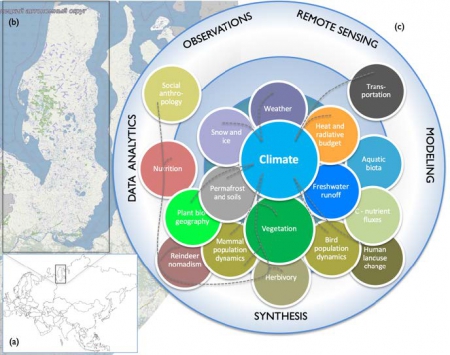Project Abstract
 This project will bring together earth system scientists, engineers, ecologists, and anthropologists to develop a plan to document and explain changes in ecosystems and their effects on the plants, animals, indigenous peoples, and industrial infrastructure of the Arctic region. It will emphasize interactions between these elements to help understand, inform, and plan for changes to come. Researchers will focus on the Yamal Peninsula, which presents a continuous gradation of habitat types from forest in the south to tundra in the north, a rich diversity of endemic and invasive plant and animal species, a large population of traditional peoples, and economically critical natural resources. Yamal serves as a small-scale and manageable model for the Arctic as a whole, wherein changes in climate and their effects on temperature, precipitation, landform, plants, animals, peoples, and infrastructure need to be understood and related to one another. The project will contribute to the curriculum development for a collaborative, transdisciplinary online inter-institutional undergraduate and graduate course to train the next generation of scientists to take a holistic approach to problem solving. The team will directly engage Indigenous knowledge holders and other stakeholders throughout the research project.
This project will bring together earth system scientists, engineers, ecologists, and anthropologists to develop a plan to document and explain changes in ecosystems and their effects on the plants, animals, indigenous peoples, and industrial infrastructure of the Arctic region. It will emphasize interactions between these elements to help understand, inform, and plan for changes to come. Researchers will focus on the Yamal Peninsula, which presents a continuous gradation of habitat types from forest in the south to tundra in the north, a rich diversity of endemic and invasive plant and animal species, a large population of traditional peoples, and economically critical natural resources. Yamal serves as a small-scale and manageable model for the Arctic as a whole, wherein changes in climate and their effects on temperature, precipitation, landform, plants, animals, peoples, and infrastructure need to be understood and related to one another. The project will contribute to the curriculum development for a collaborative, transdisciplinary online inter-institutional undergraduate and graduate course to train the next generation of scientists to take a holistic approach to problem solving. The team will directly engage Indigenous knowledge holders and other stakeholders throughout the research project.
The project aims at developing a convergence research team to study the Yamal region as an ideal natural laboratory for transdisciplinary work to understand the complexity and adaptation of Arctic biotic and abiotic systems to climate change, and the feed-forward and feedback mechanisms modulating the co-evolution of human society and natural systems. The participants will focus on developing research ideas and approaches for testing the hypothesis that displacing Arctic systems from their historic state of dynamic equilibrium under changing environment stimulates further changes to abiotic, biotic, and socio-cultural elements, particularly when combined with the spread of industrial infrastructure, to increase the role of feed-forward and feedback mechanisms. Two transdisciplinary research "transects" will be considered as main determinants of the Arctic system with two contrasting scenarios: gradual warning and extreme weather events. Planned activities will include two workshops, monthly virtual conferences, international research capacity building, and a synthesis paper.
Logistics Summary
This large Track 2 NNA collaboration is comprised of the following: Ivanov (1928014, LEAD, UMich), Ungar (1927793, U of AR), Sheshukov (1927820, KSU), Liu (1927840, OSU) and Wang (1927861, GA Tech). This project will support activities to develop a compelling Track 1 (NNA) proposal for the study of Yamal region of northern Russia, which presents an ideal natural laboratory for research to facilitate comprehensive understandings of effects of climate change on environmental, social, and built environment systems of the Arctic. Planning project only, no fieldwork will be conducted.
Keywords
Arctic, Yamal, reindeer, snow, permafrost, vegetation, climate, hydrology, energy exchange
Project Location
Dates
-Location
Yamal, Russia; Salekhard, Russia; Labytnangi, RussiaMembers
Principal Investigator

Principal Investigator

Principal Investigator

Principal Investigator

Principal Investigator

Collaborator

